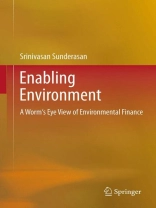Enabling Environment is as real as it gets. The global commons are jointly owned and their inhabitants are jointly obligated to ensure their preservation. In the face of protracted negotiations, convoluted documentation, discord, and incessant bickering among scientists, activists, pressure groups of various hues, politicians and negotiators, very often the people on the ground are ignored or taken for granted. In the meantime, life meanders along. It is these ‘everyday individuals’ who make consumption-related choices on their lifestyles, travel or on preferring certain products or services over others. Enabling Environment puts the individual front and center.
Ecosystem services need to be recognized, appropriately priced and the costs allocated to the agents concerned. Enabling Environment is about defining economic and non-economic incentive structures and utilizing them to arrive at pro-environmental outcomes. This collection of articles illustrates the use of existing social, economic and regulatory structures, and the financial architecture and instruments, suitably modified or extended, to help internalize the environmental externality.
Cuprins
1. Rainmakers.- 2. The Irrelevance of Political Populism: Evidence from Subsidies on Fossil Fuels.- 3. The Persistence of Green Goodwill.- 4. Broadbased Green Stock-market Index.- 5. Appendix to Chapter 4.- 6. Implied Valuation of Environmental Externalities.- 7. Basket Currency for Pricing Emission Reduction Certificates.- 8. A Retail Market for Ecosystem Services.- 9. Inducing Pro-environmental Behaviour.
Despre autor
Dr. Srinivasan Sunderasan is an Economist with Verdurous Solutions, an investment advisory and consultancy focused on the areas of Clean Energy and Environmental Finance. Areas of his specialization include Project Appraisal, Portfolio Management, Financing for Alternative Energy, Microfinance, Technology Commercialization, Industrial Economics and Business Strategy. He has, in the past, been associated with several large corporates and reputed consulting firms.
He has authored books on Project Finance and Economics of Clean Energy. He is the Development Editor for a book on internalizing externalities, published by Nova Publishers, New York, USA. Dr. Sunderasan has authored over 25 research papers, chapters in books and case studies in the recent past, which have been published by prestigious international peer-reviewed journals, universities and publishers.
He has been awarded a Doctoral Degree in Business Economics by the University of Vienna, Austria. He has also concurrently undertaken graduate course work in Economics. He holds the rare distinction of completing the Doctoral program (and the Graduate course work) in 48 weeks of academic work. He holds an MBA degree from King Fahd University of Petroleum & Minerals, Saudi Arabia, and his first degree is in Civil Engineering. He has pursued Graduate qualification in Architecture and has completed a Graduate diploma program in Environmental Law.
He is a life member of the Solar Energy Society of India, Member of the Indian Institute of Architects and an active member of the Institution of Engineers, India. He is a member of Guidepoint Global network, (formerly the Society of Industry Leaders, a Standard and Poor’s, Vista Research initiative). He is an active member of the Global Executive Forum organized by the Economist Intelligence Unit.












